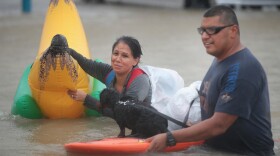
Lauren Silverman
Lauren Silverman is the Health, Science & Technology reporter/blogger at KERA News. She is also the primary backup host for KERA’s Think and the statewide newsmagazine Texas Standard. In 2016, Lauren was recognized as Texas Health Journalist of the Year by the Texas Medical Association. She was part of the Peabody Award-winning team that covered Ebola for NPR in 2014. She also hosted "Surviving Ebola," a special that won Best Long Documentary honors from the Public Radio News Directors Inc. (PRNDI). And she's won a number of regional awards, including an honorable mention for Edward R. Murrow award (for her project “The Broken Hip”), as well as the Texas Veterans Commission’s Excellence in Media Awards in the radio category.
Before joining KERA, Lauren worked at NPR’s weekend All Things Considered in Washington, D.C. There, she produced national stories on everything from the politics of climate change to the future of online education. While at All Things Considered, Lauren also produced a piece on neighborhood farms in Compton, Calif., that won a National Association of Black Journalism’s Salute to Excellence Award.
As a freelance reporter, Lauren has written and recorded stories in English and Spanish for a variety of news outlets, including NPR's Morning Edition, All Things Considered and Here & Now; American Public Media’s Marketplace; Sound Medicine and Latino USA.
-
NPR has been reporting on a chilling trend in technology and in love — the use of spying tools when couples split up. Are these tools legal?
-
The wet wipes industry is blossoming. But with the growth comes a problem: clogged drains. Now the fight over "flushability" is heading to court.
-
Amazon Echo's Alexa has helped people do all sorts of tasks. Although Alexa now has more than 15,000 so-called "skills," critics say that many of Amazon's skills are low-quality.
-
In a new series called "Is My Job Safe?" NPR looks at the future of jobs at a time of rapid gains in artificial intelligence and robotics. We start with a high-paying job in medicine: radiologists.
-
Facebook and Twitter became de facto centers for thousands of stranded people as 911 centers became overwhelmed with calls. Police and officials are using social media as an essential tool to connect.
-
For the first time, a medically approved birth control app has been certified as a method of contraception. It relies on math, an algorithm and a woman's body temperature to determine fertility.
-
Giving people who have serious mental illness peer support has proved so helpful that some states are starting to pay these peer specialists to bridge the gap when there aren't enough professionals.
-
Verizon has completed its $4.5 billion purchase of Yahoo, and, as expected, Yahoo CEO Marissa Mayer is resigning. She's turning over control to Tim Armstrong, the former CEO of AOL who is now the head of Oath, a digital media brand that combines the Internet assets of AOL and Yahoo. Verizon sees the acquisition of media content as a way to expand beyond its core wireless business.
-
The Drug Enforcement Administration is cracking down on a plant that it says is involved in a number of deaths. Advocates say kratom can help treat opioid addiction, which is a far bigger hazard.
-
Not everyone outside staring into their phones is searching for Pokémon — some people are looking for actual wildlife. The app iNaturalist is bringing together urban biologists and curious citizens.






